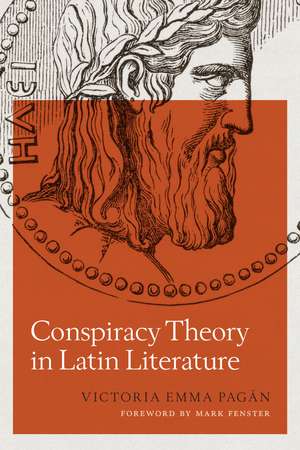Conspiracy Theory in Latin Literature
Autor Victoria Emma Pagán Introducere de Mark Fensteren Limba Engleză Paperback – dec 2012
Delving into multiple genres, Pagán offers a powerful critique of how conspiracy and conspiracy theory can take hold and thrive when rumor, fear, and secrecy become routine methods of interpreting (and often distorting) past and current events. In Roman society, where knowledge about others was often lacking and stereotypes dominated, conspiracy theory explained how the world worked. The persistence of conspiracy theory, from antiquity to the present day, attests to its potency as a mechanism for confronting the frailties of the human condition.
Preț: 166.47 lei
Nou
Puncte Express: 250
Preț estimativ în valută:
31.85€ • 33.34$ • 26.51£
31.85€ • 33.34$ • 26.51£
Carte tipărită la comandă
Livrare economică 31 martie-14 aprilie
Preluare comenzi: 021 569.72.76
Specificații
ISBN-13: 9780292756809
ISBN-10: 0292756801
Pagini: 200
Dimensiuni: 152 x 229 x 15 mm
Greutate: 0.45 kg
Editura: University of Texas Press
Colecția University of Texas Press
ISBN-10: 0292756801
Pagini: 200
Dimensiuni: 152 x 229 x 15 mm
Greutate: 0.45 kg
Editura: University of Texas Press
Colecția University of Texas Press
Notă biografică
Victoria Emma Pagán is Professor of Classics at the University of Florida. Her previous books are A Sallust Reader, Rome and the Literature of Gardens, and Conspiracy Narratives in Roman History. She also edited the Companion to Tacitus.
Cuprins
- Foreword by Mark Fenster
- Acknowledgments
- Introduction: From Conspiracy to Conspiracy Theory
- Chapter 1: Conspiracy Theory in Action
- Chapter 2: Juvenal and Blame
- Chapter 3: Tacitus and Punishment
- Chapter 4: Suetonius and Suspicion
- Epilogue: The Golden Age of Conspiracy Theory
- Abbreviations
- Notes
- Bibliography
- General Index
- Index Locorum
Recenzii
Pagan has interesting things to say about these authors and about conspiracies and the Romans’ use of (mis)informed conjecture…those interested in politics in the Roman world will welcome the book. Summing Up: Recommended. Upper-division undergraduates through faculty.
Descriere
This provocative new companion to Conspiracy Narratives in Roman History shows how viewing an array of Latin texts through the lens of conspiracy theory reveals a host of socioeconomic tensions from the Roman Republic through the age of the emperors.















